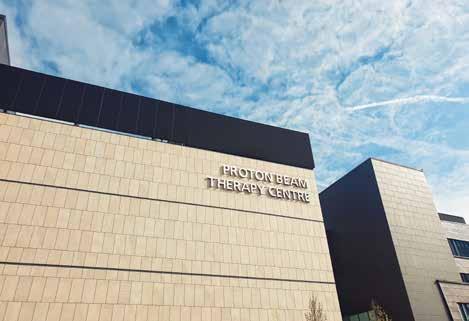
4 minute read
RANZCR: Knowledge Building at The Christie NHS Foundation Trust
from Inside News September 2020
by RANZCR
The Royal Australian and New Zealand College of Radiologists (RANZCR) Inside News September 2020
The Thomas Baker Fellowship
It was such an honour to have been selected as the recipient of the Thomas Baker Fellowship last year, providing welcomed support for my appointment as a Clinical Fellow at The Christie NHS Foundation Trust in Manchester in the United Kingdom (UK). The Thomas Baker Fellowship awards financial support to the value of $AU20,000 to one Fellow toward their return travel and living costs for a period of up to 18 months of overseas experience, allowing a qualified radiologist or radiation oncologist to further their knowledge by studying abroad.
My post commenced in December 2019, but the preparation process commenced many months prior. I made a site visit in March 2019, spent several days shadowing clinics and observing clinical operations and arranged a face-to-face meeting with the Fellowship supervisor at The Christie to demonstrate my keen interest for the Fellowship post, knowing that it would be a competitive process. Following a video interview in June 2019, I was offered the position and the process of obtaining the necessary visas, satisfying background checks, obtaining UK medical registration and the logistics of moving across the world would then subsequently take another four to five months.
The Fellowship is based in The Christie NHS Foundation Trust—the largest single site cancer centre in Europe and the first UK centre with an NHS funded Proton Beam Therapy (PBT) centre. It is a part clinical, part research Fellowship working in the PBT centre with four-month rotations through the following subsites: sarcoma, head and neck tumours, paediatric body and central nervous system tumours, and adult central nervous system tumours. As more indications are added to the UK’s Proton Beam Therapy indications list, this may expand in the future. These tumour subsites aligned well with my personal subspecialty interest areas, and I was particularly interested in expanding my experience in paediatric oncology. Though I had done most of my radiation oncology training in a centre treating paediatric cases, I felt my volume of hands-on experience with paediatric patients and pathologies was still limited.
The majority of paediatric tumour cases across the UK is referred to The Christie PBT centre which sees, on average, 15 new children of less than 17 years old per month. My experience with paediatric patients very quickly increased by the sheer volume of patients I was seeing along their treatment pathway from clinic to discussion of their case in paediatric MDTs, developing and assessing their radiotherapy plans, and being involved in surveillance through follow up reviews. Adapting to a new workplace, within a new healthcare system took some adjustment but in itself was an opportunity to learn of the different ways daily work processes and structures could be run.

The friendly and colourful paediatric waiting room area
Proton beam therapy is an area of interest that has developed with my growing passion for paediatric oncology. With Australia now having started construction on their first PBT centre at the Australian Bragg Centre for Proton Therapy Adelaide, patients, particularly parents, will be asking all the more about its role in management of their or their child’s tumour.
The clinical experience working in proton therapy has been invaluable and one which was only made possible by me venturing overseas. I have been able to learn the intricacies of working with a new form of radiotherapy, with its inherent differences to conventional photon therapy and how this manifests dosimetrically as well as clinically as patients undergo proton therapy and in their ensuing follow up years into the future.

The Proton Fellows crew: Dr Simona Gaito (left), Dr Shermaine Pan (middle), Dr Eunji Hwang (right)
The benefits of the Fellowship however extend far beyond the specifics of PBT itself. It has developed in me a very detailed, almost forensic level of scrutiny with volume delineation, and allowed a systematic approach to plan assessment and evaluation. I have no doubt it has enhanced my overall ability in technical radiotherapy which will extend into my photon practice. Given its new implementation in the UK, there is significant emphasis on systematic, accurate and consistent collection of clinical outcome data, integrated into daily clinical practice. This has developed my diligence in documentation and robust data collection, and created opportunities for progression of my PhD with projects that I have become involved with. It has allowed me to gain a sharper eye to recognise and record particular toxicities observed during treatment and beyond.
It goes without saying that aside from the immense academic and clinical opportunities, the social aspect of meeting, working with and connecting with new people while living here in the UK has been invaluable.
Now almost eight months into my Fellowship post and having lived through the onset of a global pandemic, colleagues have become friends, and my husband and I have integrated into a community here in Manchester that we love. Though the pandemic has limited our initial plans for global travel particularly around Europe, we have taken the opportunity to explore more of the UK itself with its varied beautiful countryside, amazing peaks and lakes and towns embedded in historical charm.
I would encourage any Fellow or trainee who has passed their Part II examinations to apply for opportunities overseas that align with their interest areas and to apply for the Thomas Baker award to support their endeavours.
Applications for the 2021 Thomas Baker Fellowship will open in December 2020. The application opening date will be announced via email and on the College website: www.ranzcr.com/college/ grants-and-awards/educationalfellowships
Dr Eunji Hwang
RANZCR Fellow Faculty of Radiation Oncology
Twitter: @eunjtweet










